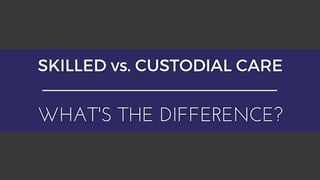Consumer Planning Blog
Never miss any update
Subscribe to the Consumer Plannig Blog newsletter today to receive updates on the latest news from our carriers.
Your privacy is important to us. We have developed a Privacy Policy that covers how we collect, use, disclose, transfer, and store your information.
Skilled vs. custodial care – what’s the difference?
 Like many other forms of insurance, long-term care insurance (LTCI) can feel like it comes with its own language. We hope you found our glossary (published December 29) helpful in defining some of the most common terms in LTCI. It’s also important to be able to distinguish between two different types of care—skilled care and custodial care.
Like many other forms of insurance, long-term care insurance (LTCI) can feel like it comes with its own language. We hope you found our glossary (published December 29) helpful in defining some of the most common terms in LTCI. It’s also important to be able to distinguish between two different types of care—skilled care and custodial care.
Skilled care
- Administered when direct medical attention is needed and provided by a licensed medical professional in a certified facility
- Patients often receive skilled care as the result of a short-term medical condition that they are expected to recover from
Custodial care
- Can be performed by someone without professional medical skills either at home or in a facility
- Provides assistance with activities for daily living (ADLs), like eating and bathing, and not direct medical treatments
- Patients receiving custodial care most often have a chronic condition where their recovery is not expected
Another important differentiator between skilled care and custodial care is what Medicare will and will not cover.
Medicare, along with private insurance, may cover short-term skilled care needs when certain conditions are met. If custodial care is the only type of care needed, Medicare will not cover these expenses. This is where long-term care insurance plays an important role.
